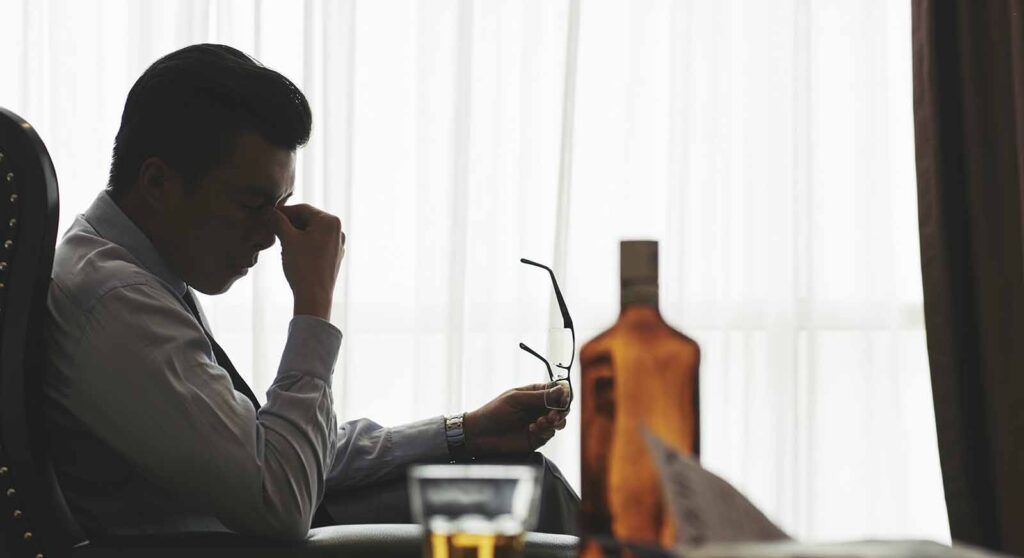The link between alcoholism and depression can prove challenging to
diagnose. Whether the depression was there to begin with or if quitting
drinking made you depressed varies on a case-by-case basis. Understanding
the relationship between the two can help you deal with your ongoing
condition and continue your road to recovery.
The Links Between Alcoholism and Depression
Everyone has their own personal reasons for why they started drinking.
Everything from social acceptance, peer pressure, and more have led
countless people to try alcohol at one point in their life. When that
interest changes from social interactions into disordered drinking, then
things become more complicated.

Sometimes, people may drink to forget a traumatic experience or avoid confronting difficult feelings about a particular event. These feelings can often present as anxiety or depression, and your brain will begin to associate drinking excess alcohol with avoiding these complex issues. As some begin to seek a substance abuse and mental health treatment program to aid their early recovery, understanding why they feel the way they do can help with short-term and long-term goals.
Symptoms of Depression
Even if you have been experiencing depression before your alcohol use disorder, the symptoms can become more pronounced when you stop drinking. Some of the most common symptoms include:
- Persistent Feelings of Sadness and Despair
- Extreme Fatigue
- Slowed Cognitive and Motor Functions
- Problems Sleeping
- Sudden Weight Issues — Either Gain or Loss
- Lost Interest in Hobbies That Brought Joy
- Intense Guilt or Shame
- Executive Dysfunction — Inability to Make Decisions
- Suicidal Thoughts
Any combination of these symptoms can point to depression or mental illness, making you more susceptible to drug and alcohol abuse. As you or a loved one are dealing with a dual diagnosis of depression and alcohol use disorder, it is vital to understand how having them simultaneously can affect the recovery path.
Why Depression and Alcohol Abuse Are Often Linked
Depression has a long history of co-occurring with a wide range of substance
abuse disorders. People will seek relief from their symptoms by drinking
more and more alcohol to receive the same boost of dopamine while feeling
more relaxed. Sometimes when you stop drinking, the depression that was
already present roars back to a place of prominence because you no longer
have that barrier between you and your feelings.
But Can I Develop Depression Because I Quit Drinking?
Quitting drinking can present a complicated mix of emotions that people must confront during rehabilitation and recovery. If you hadn’t started drinking to deal with existing depression, it’s still possible to develop similar feelings and conditions. If you’re experiencing symptoms resulting from alcohol withdrawal and not from a pre-existing condition, post-alcoholic depression can often be temporary.
It Starts During Withdrawal
Sometimes, depression begins during your withdrawal. This part of your recovery process involves flushing your system of all traces of alcohol and can last for days. It also starts the process of your body’s chemistry trying to readjust to life without the presence of booze in your system — something it grew accustomed to operating with for an extended period.
Your Mind Treats It as a Tragic Loss
Our minds are strange and fickle things. In some cases, quitting alcohol can feel like you have lost a close friend; it may even feel like that alcohol was a better friend to you than some people. So as you continue to go through detox and recovery, your mind may begin to treat the process as if it’s a grieving process. These feelings of grief can spiral into full-blown depression symptoms and potentially cause you to relapse.
You Feel the Loss of Fun
For many alcoholics, they viewed their drinking as the only time they got to be social. They made drinking buddies and had things to do after work or when things were getting bad. They used going to the bar as their only form of social interaction and feeling like they were having fun. When they quit drinking, they lose all of that. They may also begin to believe that they cannot have fun without alcohol and struggle to envision life without it, possibly creating more feelings of depression. As they continue to confront that future, the possibility of relapse increases unless they have the right support system on their side to help them through their depression and alcohol rehabilitation.
Allow Silver Pines Treatment Center to Help With Your Recovery
Whether it was a pre-existing condition or quitting drinking caused you to feel depressed, you have options available to aid your recovery. Silver Pines Treatment Center provides a host of detox programs, addiction treatment plans, support groups, and more to help you work through your co-occurring depression and alcohol abuse disorders. We work with each patient to identify their unique symptoms and challenges to help them through their recovery journey. If you or someone you love is trying to quit drinking, don’t hesitate to reach out to us at 267.209.7313.
Sources
https://smarmore-rehab-clinic.com/blog/04/2020/do-you-suffer-depression-after-giving-alcohol
https://www.webmd.com/mental-health/addiction/what-to-expect-when-you-quit-drinking



